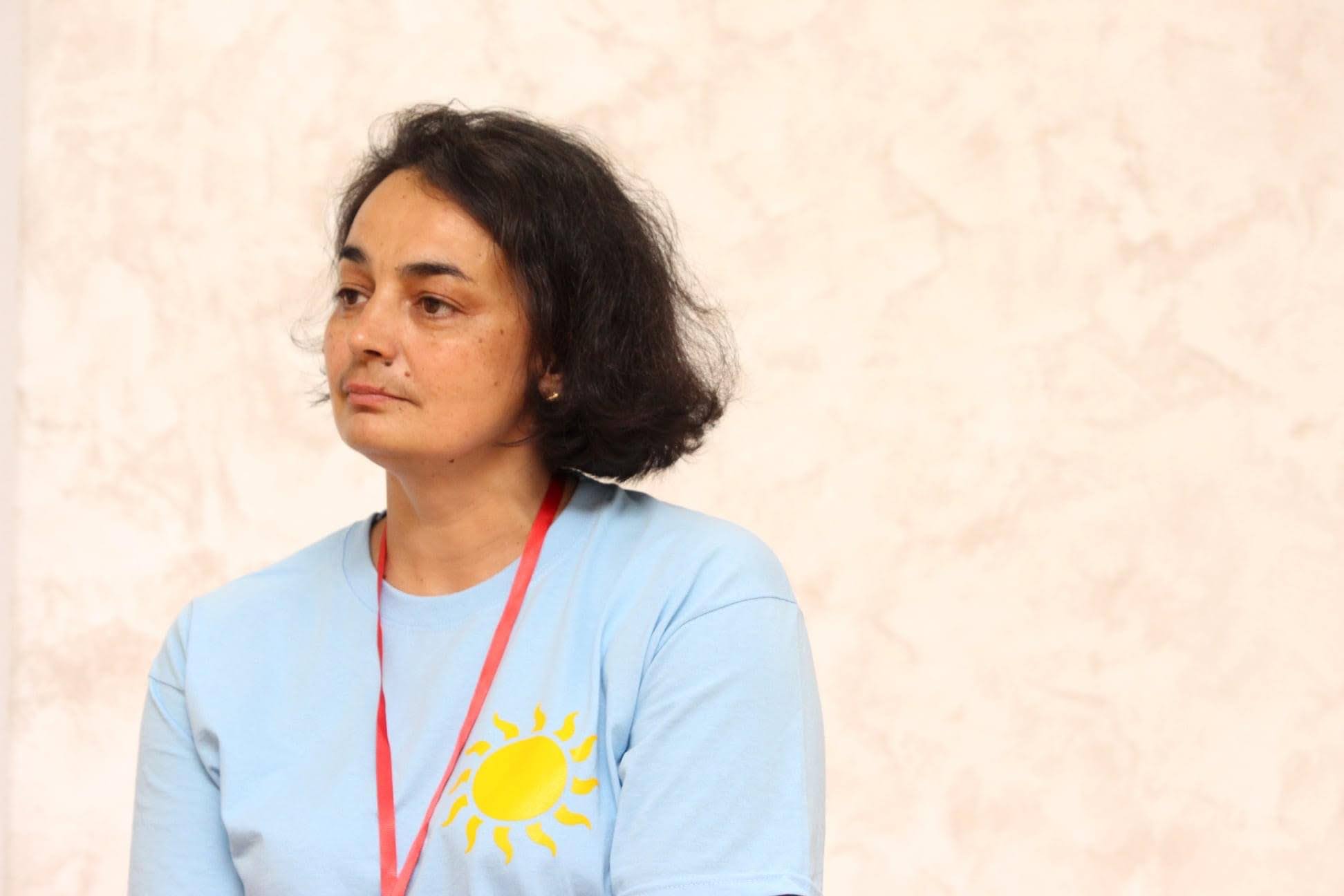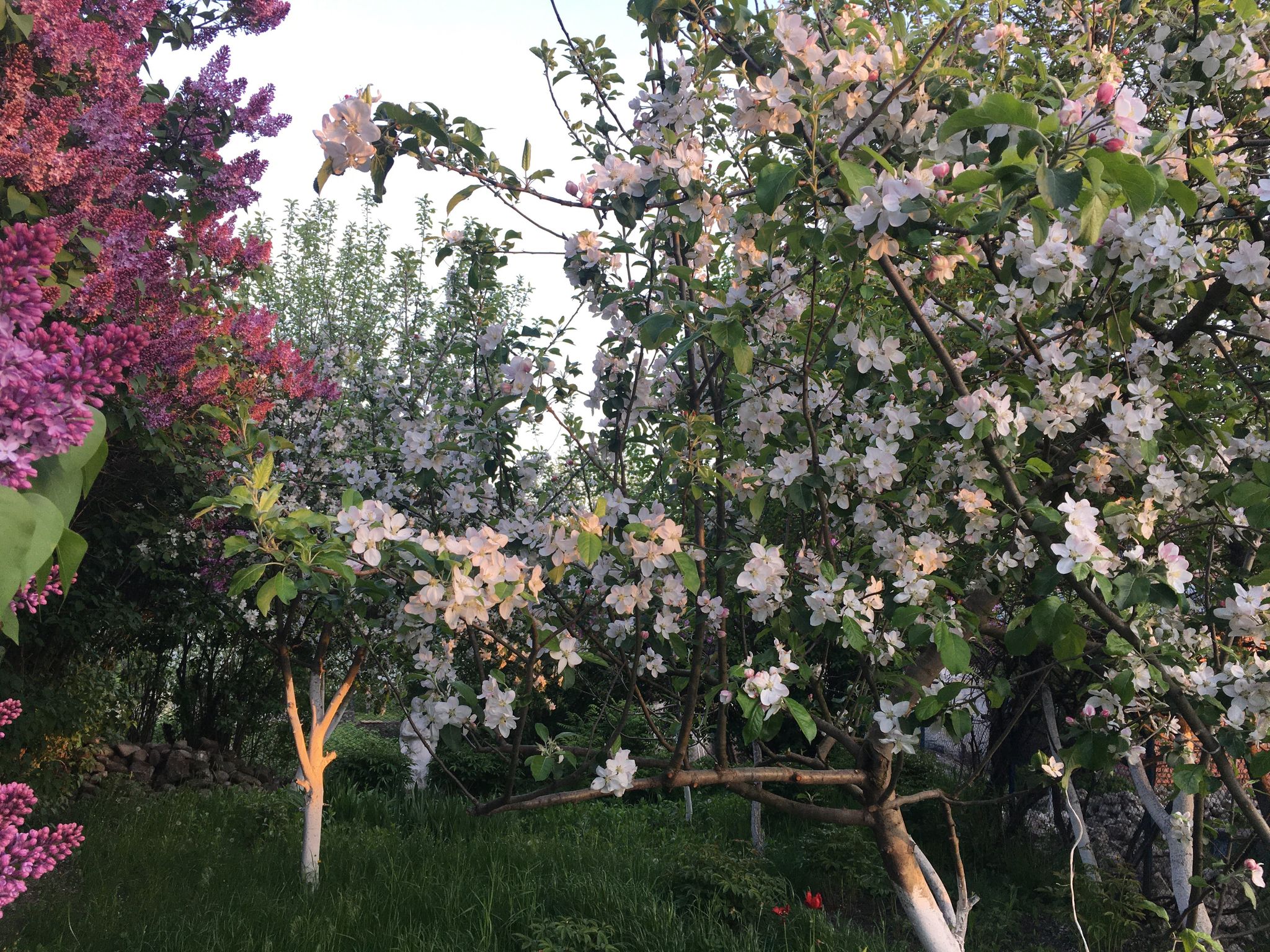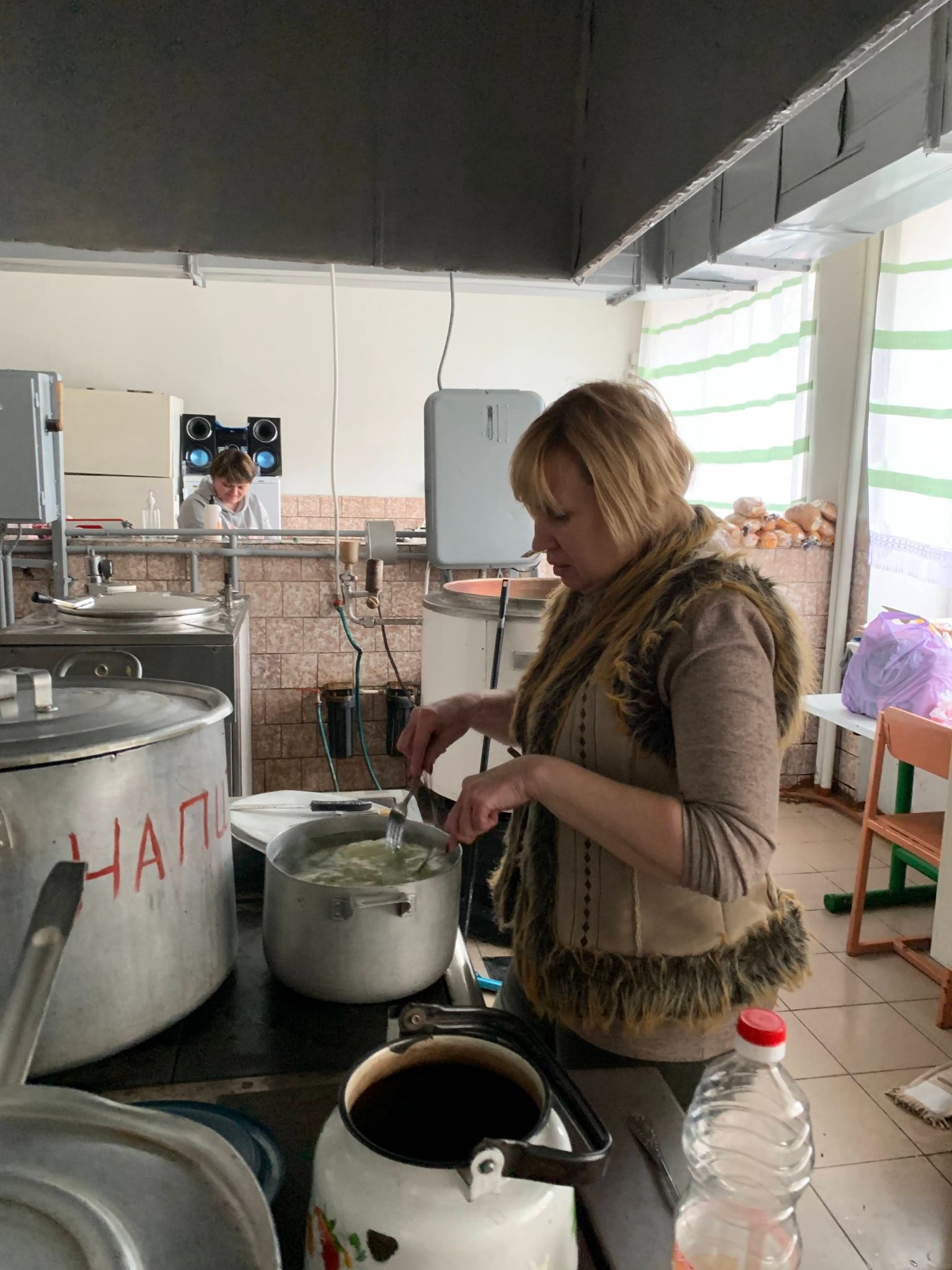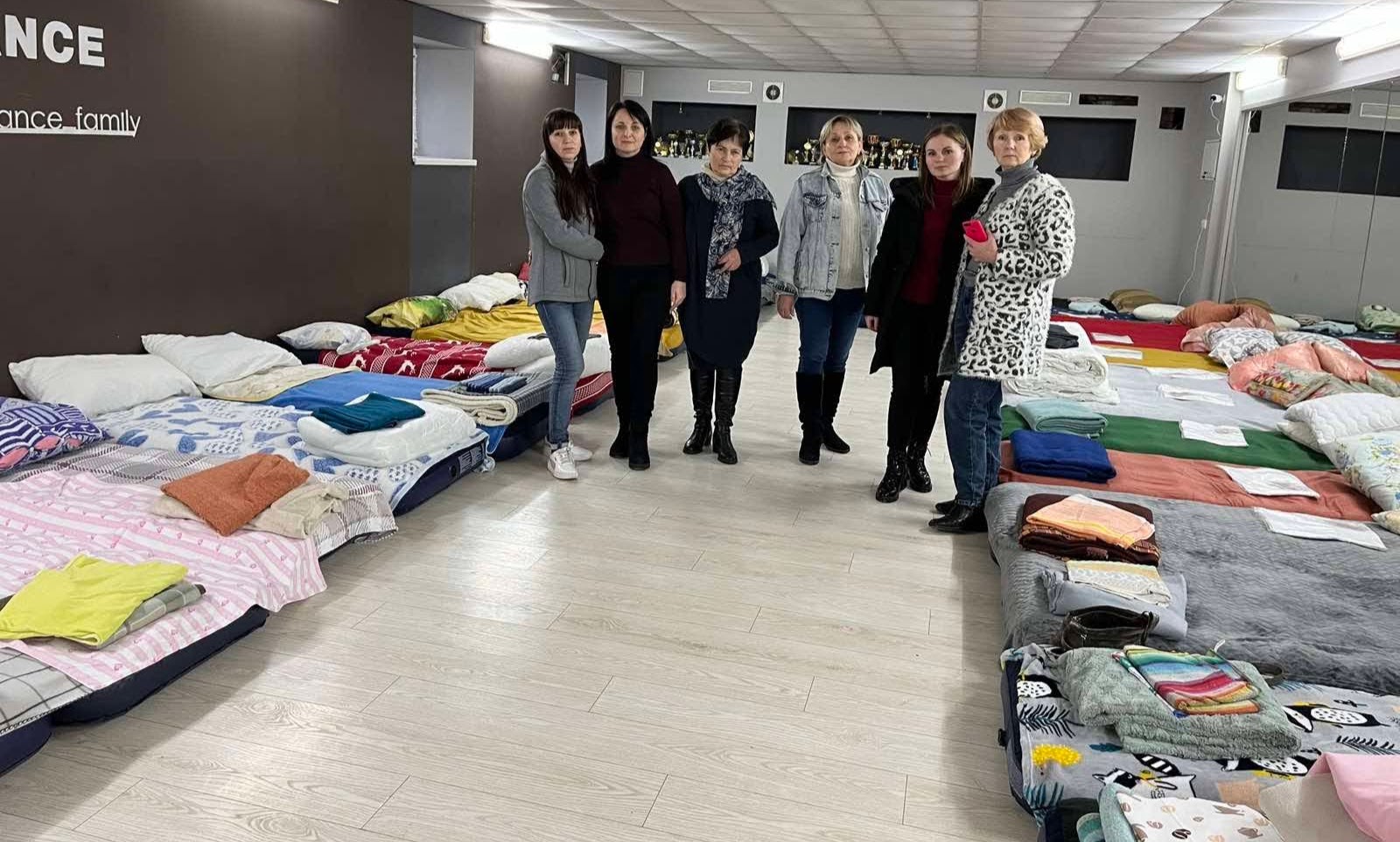Interview 21. Seeing the best in people. Liudmyla Serkiz
Liudmyla Serkiz, a teacher from Ternopil, tells us how to listen to the call of your heart, where to find faith and goodness, and why it is important to always work on yourself.
To support children in the current situation of uncertainty and anxiety, Ukrainian teachers do not force their students to work or study. In particular, they do not oblige students to do their homework, but rely on their sense of responsibility and curiosity. And it works, because children settle down, do the exercises and discuss them. Liudmyla Serkiz, a mathematics teacher from Bohdan Lepkyi School No.14 in Ternopil tells us how she manages her workday. Liudmyla is sure that in this difficult wartime period, it is necessary to see the best in people, to reveal the potential in children, and to cultivate courage.
The main lesson
In all circumstances, you must always remain Human. You have to learn to accept the situation, life as it is. You shouldn’t wait until the war is over so that you can start living. We need to wake up today, accept the current situation and build on what we have.
I have learned that we should believe people, believe the best in people, and work according to the call of our hearts. I have a calling – to help and care for others. I do this because I love my job and I don’t mind that it’s so hard and demanding.
We used to have a relaxed life and did not listen to the elderly people who warned us about war. Today, I know what war means – just like the elderly – and I can warn others: we shall be ready for anything; the war is real, it’s not so far away either – in the past or in the future.
Unshakable faith
I have many sources of strength and inspiration, and not only during the war. The last three years of the COVID epidemic were very difficult for us; we had to work a lot in order not to go to pieces. My first source of strength is my home in Ukraine, and all my loved ones, people dear to my heart, who are all here with me. These are my children, my husband and my mother. My cat is my stress reliever; I love to stroke and cuddle him.
I also have a special place – a land plot and a garden around my cottage in the village. I go there every week; it’s close to Ternopil. My colleagues never disturb me on Saturdays, because I’m there, resourcing myself. When I spend a day in the garden, on my little piece of land, I feel regenerated and reborn; I gain strength. I get a lot of strength from praying together at the school in the evening. In general, I would advise everyone to converse with the Lord. When I feel anxiety or fear, I talk to God or read Psalm 90 and add the names of my relatives to each line. When I pray, I am filled with an unwavering belief that everything will turn out fine.
Choosing Ukraine
I am Ukrainian and I am proud of it. Thanks to such terrible, hard times, the world sees our country in a completely different way. They talk about us in new intonations and don’t confuse us with Russia any more. I am also proud that my three children do not want to leave Ukraine despite these difficult times; it’s just the way they’ve been brought up.
I know a lot of people who behave and act with dignity. For example, a 25-year-old man returned to Ukraine from abroad in winter to help his single mother. He asked his mother to move to a safer area, but she refused. Now they are under occupation, and he wants to leave, so that he doesn’t have to fight against the Ukrainian Army. His choice is to come to the government-controlled territory and fight against the occupiers. From the first days of the war, my sister stayed in Kyiv. Her relatives tried to persuade her to leave, but she was firm in her decision to stay and help. Because there are a lot of isolated people in the city who could die if they don’t get help.


You shouldn’t wait until the war is over so that you can start living. We need to wake up today, accept the current situation and build on what we have.

Expel the enemy from our home
From the very first day, when I heard the news about the invasion, I immediately said, “They invaded just like the goat that broke into the rabbit’s house.” (from a Ukrainian story for children Koza-Dereza-Ed). When I think about what’s happening, I see a clear analogy with the Ukrainian tale about the goat that took over the rabbit’s house. The rabbit began asking the other animals for help, but they too were afraid of that damn goat. I just hope we find that crayfish that will pinch the goat so hard that he will leave our home.
School as a shelter
Our school was one of the first to provide assistance to internally displaced persons. We got organized in 24 hours; now, we cook food for 100 people. One of our colleagues took the children to a safer place and fully devoted herself to working in the kitchen.
The very first challenge we faced was the organization of the process. It was necessary to create at least elementary conditions for the IDPs. We knew we couldn’t do it on our own. At the beginning, our entire school community brought in everything we needed. We have large, active groups of parents and students that we addressed about our needs, and people immediately brought in bedding, food and towels. But, we were quite worried as we didn’t fully understand how much we needed.
My son is a volunteer, so he advised me to go to the humanitarian center. They provided us with inflatable mattresses, and it got a little easier. Then, we started to address other volunteer centers, and they helped us with food, household products, etc. The challenge was to organize the teachers, so that they could both hold their classes and work at the school. It was hard the first two weeks, but we managed to arrange everything. Subsequently, we contacted foreign organizations, and they began to supply us with what we needed.
Sometimes, it was difficult to find an adequate way to approach the IDPs. After all, they were often disoriented and stressed, under severe emotional strain; some had been injured when they fled from shelling.
We immediately found on-site specialists who helped solve these problems. Also, 17 preschool children arrived, and our colleagues arranged a kindergarten for them at the school, because their parents had to work. They are engaged in art therapy, interesting physical education or yoga to turn their attention away from what they have experienced.
Educational front
In Ternopil, educational institutions have already been checked for the presence of shelters and their readiness for the new academic year. Since not all schools have shelters, the city authorities have allocated 24.5 million UAH for their improvement, and it was decided that offline learning would be held only in primary schools. All other classes will switch to mixed learning, combining online lessons with traditional classroom methods Thus, only the exact number of children that can be sheltered in the school will attend live lessons, while the others will study online.
To help Ukrainian educators continue to teach children during the war, the EdCamp Ukraine community launched a crowdfunding campaign — fundraising for computer equipment and Internet access for teachers who lost their pedagogical equipment in the war. Also, the funds will be used for psychological support for teachers and the organization of conferences, where they can share their pedagogical experiences during the war. Both foreign colleagues – on the GoFundMe platform and Ukrainians – on the EdCamp Ukraine page, can join the campaign by adding a comment My War. Lessons to the payment.
Adapting to new realities
We teach online, but there are difficulties, of course. Air raid alerts, especially at night, are very disturbing. People arrive at the bomb shelters with their children; the night is exhausting, and in the morning they are no longer in any condition to work. Due to daytime alerts, we stop the lessons, because the children must run to a safe place. We also have Internet outages. In addition, there are many children living in villages and they are unable to follow the learning process. My colleagues and I are concerned that there is not enough communication: many children do not want to turn on the cameras and we cannot see their eyes.
I had three IDP children in my class: a boy from Snihurivka and two girls from Chernihiv. One girl and her mother went to Germany. But, she liked being with us so much that she wanted to continue studying at our school from abroad. I talked about it with our students when I prepared them for their new classmates. Therefore, these children have adapted quite positively; my students accepted the newcomers at once. I follow their correspondence in groups; the children are happy to help each other.


The most important thing is for children to have the resources and the inspiration to learn. Therefore, at the beginning of the lesson, I tell them positive stories.

No pressure
We try to organize a complete study process. In the lesson, I back up and duplicate the material with videos so that children can watch them at a convenient time if they do not understand something.
The first thing I changed was the ambience and spirit in class. Now the most important thing is for the children have the resources and the inspiration to learn. Therefore, at the beginning of the lesson, I tell them positive stories. I choose the material so that it is easily accessible to the majority, do not force the children in any way, and give only positive assessments. I want every boy and girl to complete the exercise; I want them to do it on their own, feel that they can, and achieve success. I work on the My Class platform, which include training exercises, independent work and tests. I give children a lot of time, sometimes even a week, as well as a few attempts to perform the assignments, and I credit the attempt with the best result. With regard to homework, my children and I agreed that it was necessary so as to consolidate the material; whoever can do it, does it. I don’t force my children, and it works, because they work together and discuss tasks on their own initiative.
Uncertainty and tension
Many children told me that they were most concerned about the uncertain future. The 8th and 9th grade students are very worried the next academic year, especially with regard to offline studies. More aware students, who know what they want at the moment, make full use of this time and study systematically. They also look for more live communication. Before the war, the students treated school differently, but now everyone wants to gather there like before.
A large number of children visit our school stadium. They play football and volleyball; our school staff gathers in the open air. It’s not so tense in Ternopil. But, we feel the tension in the children whose parents are at the front. There are children who withdraw, do not take part in lessons. There are cases when friends are split up: one child is left here and the other is taken abroad, and both feel sad. We communicate with them personally.
New ideas for a new school
I have a very relevant topic for the EdCamp (un)conference – the creation of a New Ukrainian School, the regeneration of our education. The NUS will not be the same as before; we need to discuss new ideas, new methods that we have developed during the wartime period.
Thinking more critically
Ukrainian teachers can share with their foreign colleagues how to combine work and volunteering, how to feel needed and not burn out while doing all this. We all need to build up our patience, optimism and belief in our victory.
We also need to work on ourselves, be optimistic and help others. If you want things around you to be better, you have to improve yourself in everything you do.
As a teacher, I want to say that you should always think critically. Productive thinking is also important. I’ve been working on it for the last three years. It combines both critical thinking and the development of one’s own ideas and the creation of something new. In class, you always need to be media literate; this is very important in our time. I teach children to be brave and not to be afraid of taking risks. These qualities must be developed in all circumstances.
Text — Halyna Kovalchuk.
The interview series My War. The Lessons was prepared with financial support from the Black Sea Trust for Regional Cooperation – a project of the German Marshall Fund of the United States.
The views and opinions expressed are those of the author and do not necessarily reflect the official policy or position of EdCamp Ukraine and the Foundation.











